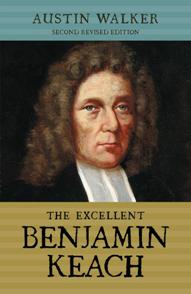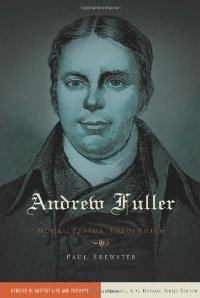Posts Tagged ‘Baptists’
“The Excellent Benjamin Keach”
 Would you allow me to draw your attention to a book? It is my father’s work, and concerns a man that you may not know, a seventeenth century Baptist called Benjamin Keach. Keach was one of the movers and shakers of the century, a prominent London Baptist who faced fierce persecution but also saw sweet blessings. He was a pastor of the church which can be traced to the one meeting today at the Metropolitan Tabernacle.
Would you allow me to draw your attention to a book? It is my father’s work, and concerns a man that you may not know, a seventeenth century Baptist called Benjamin Keach. Keach was one of the movers and shakers of the century, a prominent London Baptist who faced fierce persecution but also saw sweet blessings. He was a pastor of the church which can be traced to the one meeting today at the Metropolitan Tabernacle.
Might I also say that it is not just a tale for Baptists or historians, though both would find it delightful. His example as a man who wrestled toward truth, stood fast in accordance with his convictions, was prepared to suffer for the cause of Christ, and served the Lord and his people faithfully and fruitfully, makes him a worthy study for any Christian, perhaps especially any pastor.
This is a revised second edition of what is now the standard work on the life of this Baptist pastor and preacher, taking account of research conducted since the original publication. It can be found at the publisher’s website, and it is available in hardback (Amazon.com / Amazon.co.uk) and paperback (Amazon.com / Amazon.co.uk) and now has the virtue of an index, making it more useful to scholars. I strongly recommend it.
Review: “Looking Unto Jesus”
Looking Unto Jesus: The Christ-Centered Piety of Seventeenth-Century Baptists
J. Stephen Yuille
Pickwick Publications, 2013, 120pp., paperback, $15/£10
ISBN 978-1-62032-177-5
The substance of this wonderfully rich little book consists of a pithy introduction offering four reasons why the author keeps returning to the Puritans, then two treatises by early Particular Baptists of Puritanic stamp (Thomas Wilcox and Vavasor Powell), each followed by an essay in which Yuille chews over the substance of the treatise. For me, the high point of the book was Wilcox’s Guide to Eternal Glory (also known as Honey from the Rock and Christ is All), a sustained panegyric to the sufficiency and sweetness of Christ. Yuille’s treatment cannot add to its tone and substance, but demonstrates the consistency of Wilcox’s work with the best of Puritanism as a whole. Powell’s short piece consists of three ‘re-imagined’ conversations between Christ and a publican, a Pharisee and a troubled saint (in Yuille’s assessment, the troubled penitent, the moral hypocrite, and the anxious disciple). Yuille demonstrates how, in response to the specific circumstances of each, Christ is presented as Shepherd, Judge and Husband, so answering each case. Whether as simple servings of sweet spiritual sustenance or cookery lessons for pastors and preachers learning to dish up the same, this excellent volume presents ‘Puritan’ and Baptist experimental piety at its purest and best. Sit and eat!
Review: “Andrew Fuller: Model Pastor-Theologian”
 Andrew Fuller: Model Pastor-Theologian
Andrew Fuller: Model Pastor-Theologian
Paul Brewster
B&H Publishing Group, 2010, 224pp., paperback, £15.75 / $24.99
ISBN 978-0805449822
Among the most significant Baptist theologians of the past 300 years, Andrew Fuller is slowly developing the reputation and garnering the attention he deserves. Paul Brewster’s study of Fuller as pastor-theologian will only contribute to this momentum. Brewster, himself what some call a ‘reverend doctor’ (a phrase Fuller would have loathed from his soul), contends that Baptists need more men who – like Fuller – combine an earnest and faithful pastor’s heart with orthodox and profound theological acumen. To encourage this, he puts Fuller in his context, then considers his theological method (this chapter is particularly strong and fresh), his soteriology (intelligently discussing Fuller’s commitment to substitutionary atonement alongside his use of governmental language), and his pastoral practice (including his evangelistic and missionary labours). The author’s concluding sketch of Fuller as pastor-theologian shows that Brewster is no mere hagiographer, but an insightful and careful student as he gives us a sympathetic but carefully nuanced portrait of this man of God. Brewster’s style can be a little workmanlike at times, and one might take careful issue with his contention that Fuller opened the door to radical and unhealthy changes in Baptist theology (other, stronger currents feeding this stream can be identified). Nevertheless, pastors would be well-served to consider the model presented here, and Brewster’s cogent plea to embrace and pursue it. Any servant of God seeking the means and a pattern for the establishment and exercise of an accurate and active theology might profitably start here.
Review: “Baptist Autographs in the John Rylands University Library of Manchester 1741-1845”
 Baptist Autographs in the John Rylands University Library of Manchester 1741-1845
Baptist Autographs in the John Rylands University Library of Manchester 1741-1845
Transcribed and ed. Timothy D. Whelan
Mercer University Press, 2010, 522pp., cloth, $55 / £48.95
ISBN 978-0881461442
The ‘accidental’ discovery of a few letters by the editor of this volume led to further burrowing into the archives of the John Rylands University Library, eventually bringing to light some 300 letters sent within the Baptist community from 1741 to 1845, the vast majority previously unpublished. Diving in, we enter worlds at once strange and familiar, displaying a whole range of theological, ecclesiastical, and domestic concerns across a fascinating and seminal one hundred years of denominational history. In this, the volume transcends the merely academic sphere, and sheds light on a swathe of issues of principle and practice, both seemingly prosaic and indisputably significant. Although many letters involve luminaries such as John Sutcliff (prominently), Andrew Fuller, John Gill, the senior and junior Rylands, William Carey, William Knibb, Joseph Ivimey and John Rippon, there are hosts of less well-known men and women represented, plus non-Baptists such as George Whitefield and John Newton. The biographical footnotes and the magnificent 126 pages of biographical index, giving sketches of some 300 individuals, are probably worth the price of the book in themselves, not to mention a variety of helpful indeces. We owe Dr Whelan a great debt of gratitude for his painstaking labours, which have made available an invaluable resource for Baptist historians, and one which individuals as well as colleges and seminaries will crave.
PS I know it’s a Ronseal title, and not the most thrilling (this may not be a field where imagination is in great demand), but at least you’ll not forget what’s inside.
Another blog blizzard
I had a blast through the blog reader recently, and whittled it down, knocking away huge chunks of debris. Here is a selection of what caught my eye as worth considering a little more.
- Al Mohler addresses evangelical discernment and The Shack, the idolatry of youth, children’s online existence, and the importance of preaching.
- Steve Weaver posts a series of links to articles by Michael Haykin in Reformation & Revival, most addressing aspects of Baptist history.
- Trevin Wax assesses the state of the blogosphere.
- Euan Murray explains why rugby takes second place to true religion.
- Kevin DeYoung laments the fetid pool of self-promotion, as well as offering three posts on writing that are insightful. He also reminds us (saw this ages ago, still funny) of the sort of counselling that I think some pastors are sometimes tempted to:
- Iain D. Campbell points us to advice on how not to be a missionary.
- The Resurgence suggests that we identify passion builders and stealers and strategies to deal with them.
- Justin Taylor offers: Sunday’s comin’; suggestions for initiating gospel conversations; Plantinga’s beautifully and biblically balanced thoughts on the redeemed life; some perspectives on depression and medicine; thoughts on evangelical biblical illiteracy; and, ambition for evangelical academics.
OK. Nuff.
A learned ministry
From Michael Haykin:
Historically, one of the key differences between Baptists and Presbyterians-fellow Kingdom-sojourners for much of their respective histories (one thinks of the friendship of Andrew Fuller and Thomas Chalmers, for example)-is an area that is rarely discussed, namely, the concept of a learned ministry.
Far more Baptists than Presbyterians have recognized that God can and does call to pastoral ministry men who have not had formal theological education. In Baptist history, one thinks of John Bunyan, for example, or John Gill, that indefatigable commentator, or Fuller, the theological father of the modern missionary movement, or William Carey or those remarkable preachers C.H. Spurgeon and Martyn Lloyd-Jones (yes, the “Doctor” was a Baptist-read his lecture on baptism in his three-volume study of Christian doctrine). To be sure, these men read and studied and were self-educated, but they lacked formal credentials.
Having spent twenty-seven years in formal theological education, I am more than ever conscious that while such an education is extremely desirable for an effective ministry, it is not indispensable. And I am ever so glad that my Baptist forebears made room for men like those listed above, some of whom are among my theological mentors as a Christian. To think that because a man lacks formal credentials, he cannot reason and write with powerful acumen and insight is simply a species of arrogance.
Andrew Fuller, by trade a farmer, by calling one of the profoundest theologians of the Baptist profession, surely had it right when he said:
“As to academical education, the far greater part of our ministers have it not. [William] Carey was a shoemaker years after he engaged in the ministry, and I was a farmer. I have sometimes however regretted my want of learning. On the other hand, brother [John] Sutcliff, and brother [Samuel] Pearce, have both been at Bristol [Baptist Academy]. We all live in love, without any distinction in these matters. We do not consider an academy as any qualification for membership or preaching, any further than as a person may there improve his talents. Those who go to our academics must be members of a church, and recommended to them as possessing gifts adapted to the ministry. They preach about the neighbourhood all the time, and their going is considered in no other light than as a young minister might apply to an aged one for improvement. Since brother [John] Ryland has been at Bristol, I think he has been a great blessing in forming the principles and spirit of the young men. I allow, however, that the contrary is often the case in academies, and that when it is so they prove very injurious to the churches of Christ.” [“Discipline of the English and Scottish Baptist Churches”, Works (Sprinkle Publications, 1988), III, 481].


















